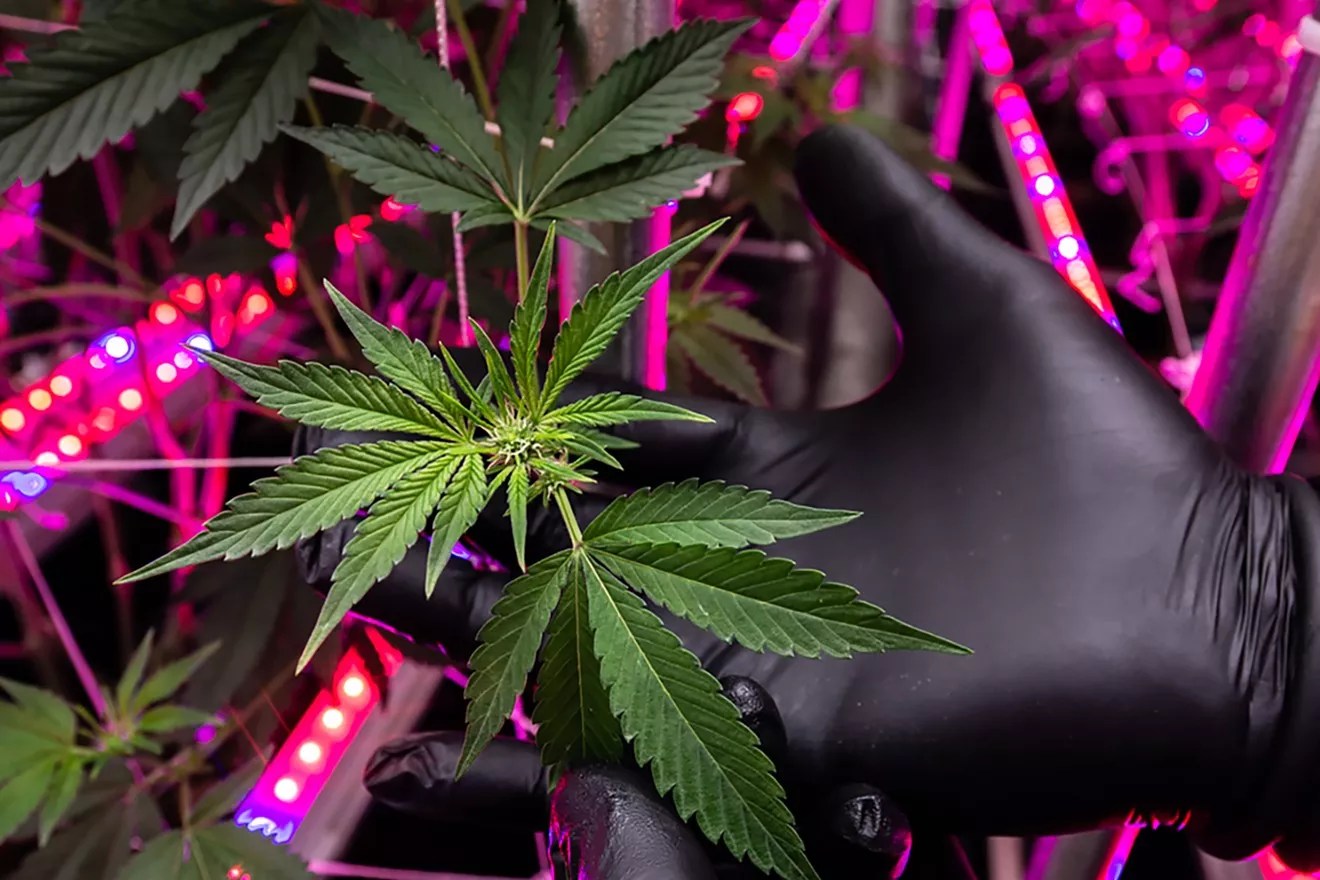
Geri Koeppel

Audio By Carbonatix
The city of Mesa has delayed until November its decision on amending zoning codes that dictate where cannabis-related facilities can open or relocate.
The amendment, which originally was scheduled for a vote during the City Council’s Aug. 28 meeting, received a continuance to Nov. 6 following comments from a Mesa dispensary owner.
During a council meeting on Aug, 21, Conor Counselman – who owns Nova Dispensary on West Broadway Road – addressed a number of issues about the zoning changes. Counselman’s concerns included a lack of notification by the city to impacted marijuana businesses or property owners and language changes that had not been presented to or approved by the city’s Planning & Zoning Board.
“The city’s presentation and staff report both focus on incentivizing dispensaries to move. However, there is no incentive anywhere in this amendment,” he said during the meeting.
“The sole purpose of ordinance 5803 is to cover up mistakes that were made by city staff,” he added.
The city wants existing dispensaries, cultivation facilities and infusion centers to relocate to one of a select number of industrial areas that are at least 80 acres in size and zoned “light industrial” or “general industrial.” The proposed changes to city code are outlined in Ordinance No. 5803.
“It has become apparent that one of the most appropriate and compatible locations for marijuana facilities in Mesa is within large industrial areas that are located along wide arterial streets,” the ordinance notes.
The proposed changes would allow cannabis facilities as close as 1,000 feet from each other. Currently, 5,280 feet – 1 mile – is required. Under the new guidelines, facilities would still need to be separated by and maintain a minimum 300-foot setback from a major roadway. The ordinance defined that as a highway or a current or planned six-lane arterial roadway.
Marijuana establishments also are required to maintain minimum distances from residences, social services facilities, schools, churches, libraries and other public establishments. According to the amendment, the distance rules would remain in place. However, if the zoning codes are changed, pot facilities “would be bettered buffered and insulated from other land uses.”
The city pointed to five areas that meet the new requirements: near Phoenix-Mesa Gateway Airport and along the Elliot Road Tech Corridor in the southeast, along the Broadway Road Corridor in west Mesa, and near Falcon Field Airport and the Riverview area in the northern parts of the city.

The Mesa City Council delayed until November a vote on revising the city’s cannabis zoning ordinance.
O’Hara Shipe
Restrictive zoning doesn’t serve ‘public good’
But highly restrictive zoning isn’t needed for cannabis businesses, according to Demitri Downing, founder and president of the Marijuana Industry Trade Association of Arizona.
“The reason it’s not necessary is because marijuana is now accessible legally for medical or adult-use purposes throughout the Valley,” Downing told Phoenix New Times. “What public good does it serve the citizens, the consumers or patients, the taxpayers to have it limited to a certain area? What is the public good that is served there?”
The city wants to change zoning for cannabis businesses to shift them to areas buffered from residential and commercial developments, said Kevin Christopher, a public information officer for Mesa.
“The proposed amendments are intended to promote the development and redevelopment of industrial sites by incentivizing existing marijuana facilities to move to those industrial sites,” he said. “Additionally, the proposed amendments will benefit the public by encouraging existing marijuana facilities to relocate to areas that the city has found to be most appropriate for the use – large, industrial developments that are appropriately set back from streets.
If existing facilities relocate to the new areas, the businesses will face a shorter separation requirement from one another, Christopher added.
The zoning changes would apply only to existing cannabis facilities. However, they are only recommendations. If ordinance 5803 passes, facilities would not be required to relocate.
Currently, there are 17 marijuana-related businesses in Mesa. Three additional dispensaries are on county islands within the city and fall under Maricopa County jurisdiction. Only medical and dual-licensed dispensaries are allowed to operate in the city. Recreational-only dispensaries are not allowed. Cultivation and infusion facilities also are permitted.
The council, during a study session on Aug. 24, agreed that in response to Counselman’s comments three days earlier that it would revisit the proposed zoning changes and make revisions. The council formally postponed a vote on the changes during its Aug. 28 meeting.
Downing said restricting cannabis businesses is not the answer to any concerns about marijuana.
“What I would like to see is some better understanding from civic leaders, from politicians and administrators, as to the necessity for education around substance use and substance abuse. The messaging, the advertising is the key, not the location. We solve our problems through education, not through manipulation and prohibition and walls and barriers. Restricting the free market is never the path to victory,” he said.